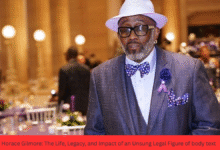
Horace Gilmore: The Life, Legacy, and Impact of an Unsung Legal Figure
Horace Gilmore may not be a household name, but in the corridors of legal scholarship and federal judiciary history, his presence is quietly powerful. When you hear the name Horace Gilmore, you might not immediately picture a trailblazer or a mover and shaker but that would be an oversight. His career in public service and his time as a United States District Judge laid down serious markers in the American legal system, even if his story hasn’t been sensationalized or widely told.
This article digs into the layered legacy of Horace Gilmore, from his early days and educational background to his pivotal role as a federal judge. We’ll explore how he made a lasting imprint on Michigan’s judicial landscape, what principles guided his decisions, and why his legacy still matters today. Whether you’re a legal enthusiast, a student of American governance, or simply curious about lesser-known yet influential figures, you’ll find Gilmore’s life story remarkably engaging.
Early Life and Academic Foundations
Horace Gilmore was born into an era of change, where the nation was shifting socially, economically, and politically. His upbringing instilled a strong sense of discipline and service, values that would later define his professional life. Born in Michigan, Gilmore came of age at a time when public institutions were grappling with their roles in a rapidly modernizing society.
He pursued his undergraduate studies with purpose and diligence, later attending the University of Michigan Law School. The law school, a historic and prestigious institution, shaped Gilmore’s legal philosophy. While at the university, he was known for his methodical approach to legal problems and his deep understanding of constitutional law. These formative years were crucial in establishing his intellectual rigor and setting the tone for his career ahead.
Gilmore’s academic record was nothing short of stellar, but what set him apart was his commitment to public service. Even before graduating, it was evident that he was not just aiming for personal advancement he was being groomed, perhaps subconsciously, for a life committed to civic duty.
Early Career and Legal Footing
Before taking his seat on the federal bench, Horace Gilmore built a strong reputation in both the public and private sectors. His early years as a practicing attorney in Michigan allowed him to sharpen his litigation skills, often dealing with cases that involved complex issues. It was during this time that he developed a reputation for fairness, integrity, and an unshakeable sense of justice.
Gilmore also served in the United States Army, an experience that further deepened his sense of national service. His military tenure taught him about discipline and chain of command, but it also expanded his worldview, shaping his understanding of international and domestic law. These experiences made him more than just a lawyer they made him a deeply principled man of action.
When he eventually transitioned to government roles, he did so with the clear aim of making systems better rather than merely benefiting from them. Whether working in the prosecutor’s office or navigating through the complexities of civil law, Gilmore’s contributions were marked by clarity and purpose.
Federal Judicial Appointment
Horace Gilmore’s federal appointment was both a reflection of his legal acumen and a nod to his enduring dedication to public service. Appointed by President Ronald Reagan, Gilmore became a United States District Judge for the Eastern District of Michigan. His nomination was widely regarded as a solid choice, a balance of traditional legal wisdom and modern judicial restraint.
As a federal judge, Gilmore presided over a wide variety of cases, ranging from civil rights issues to commercial litigation. His courtroom demeanor was calm but commanding. He was known to be particularly attentive during hearings, often leaning forward slightly, as though physically trying to catch every word spoken. This body language mirrored his deep commitment to hearing all sides and making balanced judgments.
Gilmore didn’t seek the spotlight, and that perhaps worked in his favor. His judgments were rarely controversial, but they were almost always respected. He had a knack for issuing decisions that reflected not just the letter of the law but also the broader spirit of justice. This made him particularly effective in cases where precedent was murky or public emotions were high.
Judicial Philosophy and Style
Horace Gilmore’s judicial philosophy could be described as a careful blend of textualism and pragmatism. He wasn’t a rigid interpreter of the Constitution, nor was he a freewheeling judicial activist. Instead, he walked a middle path honoring the original text while recognizing the evolving needs of society.
In criminal cases, Gilmore was firm but fair. He believed in the law as a tool for both punishment and rehabilitation. He frequently emphasized the importance of proportional sentencing and due process. While other judges might have been swept up by public opinion or media narratives, Gilmore stood as a stoic figure of reason.
In civil cases, he demonstrated a deep empathy for marginalized communities, without ever compromising the legal frameworks within which he operated. His rulings in employment discrimination cases, for example, often displayed a nuanced understanding of systemic inequality. Gilmore didn’t see the court as a tool for social engineering, but neither did he shy away from using it as a force for equitable resolution.
Notable Cases and Courtroom Moments
Throughout his time on the bench, Horace Gilmore presided over several noteworthy cases. While he never sought publicity, his name did appear in legal reviews and academic journals, particularly when it came to labor law and constitutional matters. His handling of these cases was often used as a benchmark for judicial conduct.
In one particularly complex case involving municipal corruption, Gilmore showcased his meticulous approach by allowing all evidence to be examined thoroughly before passing judgment. Legal scholars later praised the ruling as a masterclass in procedural fairness. The way he handled cross-examinations, witness testimonies, and objections made his courtroom a model of judicial excellence.
Another example of his diligence came in a case involving freedom of speech and the press. While many expected a quick dismissal or ruling, Gilmore chose to hear extensive arguments from both sides. His ruling, which balanced First Amendment rights with public decency laws, became a referenced case in many law school syllabi.
Relationship with Colleagues and Legal Community
Gilmore was deeply respected by his colleagues on the bench, as well as by attorneys and clerks who worked under him. He mentored many young legal minds, often encouraging them to pursue careers in public interest law rather than chase private wealth. This dedication to mentorship was not performative it stemmed from a genuine belief in building a stronger, fairer legal system.
Clerks who worked with Gilmore recall his open-door policy, where they could walk in and ask for advice without hesitation. He valued discussion and was never afraid to admit when he needed a second opinion. This humility set him apart in a field where ego often takes center stage.
He was also active in various legal associations and often spoke at law conferences. Unlike some judges who remain insulated, Gilmore stayed connected to the broader legal community. His speeches were marked by clarity, wit, and a deep understanding of the socio-political context surrounding the law.
Personal Life and Character
Behind the robe and gavel, Horace Gilmore was known to be a kind and thoughtful person. He led a quiet personal life, preferring the company of close friends and family to grand public appearances. His humility, both inside and outside the courtroom, earned him the admiration of many.
Despite his high-ranking position, Gilmore never distanced himself from his roots. He often spoke about the importance of community service and led by example through charitable work and civic involvement. His moral compass was steady, guiding him not just in courtrooms but in everyday life.
Gilmore had a deep appreciation for classical literature and was known to quote historical texts during informal conversations. This love for the written word mirrored his judicial style precise, balanced, and deeply considered.
Legacy and Lasting Influence
Though not a media darling or celebrity judge, the legacy of Horace Gilmore is profound. His rulings continue to influence case law in Michigan and beyond. Legal professionals still refer to his written opinions for guidance, particularly in cases involving civil liberties and ethical governance.
His legacy also lives on through the many legal minds he mentored and inspired. From law professors to federal clerks and public defenders, Gilmore’s impact stretches far beyond the courtroom. His balanced approach serves as a guiding light in an era where judicial impartiality is more important than ever.
In a profession where sensationalism often drowns out substance, Horace Gilmore remains a quiet yet powerful figure a testament to the enduring value of integrity, diligence, and quiet leadership.
Conclusion: Why Horace Gilmore Still Matters
Horace Gilmore may not be a name etched in every history book, but his contributions to American law are undeniable. In a time when the legal system faces unprecedented challenges, looking back at the careers of judges like Gilmore can be both instructive and inspiring. He wasn’t flashy, and he didn’t seek fame, but he delivered justice with a sense of purpose that remains deeply admirable.
His life serves as a reminder that sometimes, the most impactful figures are those who simply do their jobs well, with fairness, compassion, and relentless integrity. The story of Horace Gilmore isn’t just about one man it’s about what the law can be when handled with care and conviction.


